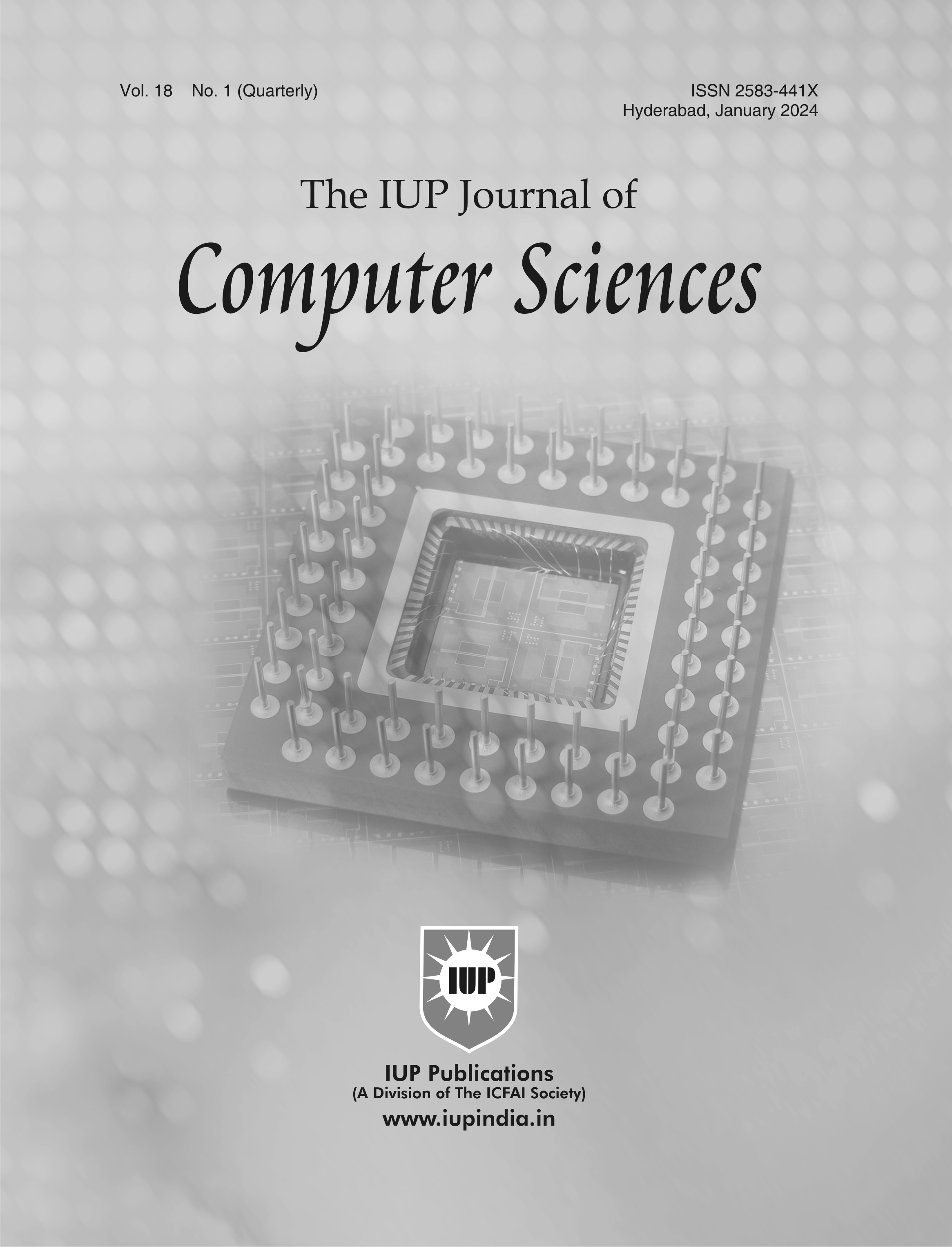
Jan'2024
Welcome to the IUP Journal of Computer Sciences
Focus
The second paper is "Comparative Assessment of ResNet and VGG16 in Brain Tumor
Classification", by Agnibh Pathak, Abir Dey and Vijayalakshmi A. Brain tumor poses a
complex challenge to modern medical treatment. During the initial stages of tumor
growth, radiologists prioritize accurate and efficient analysis. Deep learning has
emerged as a valuable tool for timely and precise intervention in patients with tumors.
Notably, the deep residual network (ResNet), incorporating convolutional neural
networks (CNNs) and VGG16, has demonstrated significant success in detecting and
categorizing images. This advancement in deep learning holds the potential to aid
radiologists in diagnosing tumors noninvasively. By enhancing comprehension of MRI
images and improving training speed and accuracy, deep learning could revolutionize
medical research. The study focuses on employing transfer learning with pretrained
ResNet50 and VGG16 models, both built on CNN architecture, to investigate multiclass
brain tumor classification.
The last paper is "Smart Tourism in India: Leveraging Technology for Enhanced
Visitor Experience", by Naveen Kumar R, Pavithra R, Yuvaraj V and T Muthu Kumar. India
acknowledges the transformative power of technology in its diverse and captivating
tourism landscape. Embracing the concept of smart tourism, the country is leveraging
advanced technologies like the Internet of things (IoT), artificial intelligence (AI), big
data analytics, mobile apps and augmented reality (AR) to offer seamless and
personalized experiences to tourists. IoT devices like beacons and wearables provide
real-time information, while AI-driven chabot enhances customer support. Big data
analytics optimizes tourist flows, and mobile apps serve as digital companions for
booking and updates. AR brings India's cultural heritage to life, further engaging visitors.
Despite challenges like cyber security and preserving authenticity, smart tourism holds
enormous potential to propel India's tourism industry to greater heights. Collaboration among stakeholders is vital to unlock the full benefits of technology-driven tourism. The
authors have conducted an empirical investigation into the importance of using
information and communications technology (ICTs) during the tourism experience,
evaluating their accessibility and impact on tourist decisions. They analyze the
influence of Internet-based applications and information on the tourism experience and
overall satisfaction levels. The study, based on a dataset of 285 tourists in a selected city,
establishes significant associations between opinions on AI, AR, technology in
ecofriendly initiatives and sustainability in smart tourism.
Consulting Editor
Nature-Inspired Harmony Search Algorithm: Latest Developments and Variants
Metaheuristic optimization algorithms involve various mathematical techniques inspired from nature and various day-to-day activities. These techniques provide the best solution at minimum cost and error along with maximum profit and utility. They can solve many tough optimization problems where conventional computing techniques do not work. Harmony search algorithm (HSA) is one such relatively recent technique. It is derived from the theory to obtain perfect harmony in music. It can handle diversification and intensification, which makes it a highly efficient metaheuristic algorithm. The paper reviews the latest developments and variants of the algorithm in HSA. It provides insights into the algorithm's applications to help the readers understand it and apply the knowledge obtained in further work.
Comparative Assessment of ResNet and VGG16 in Brain Tumor Classification
Brain tumor presents a complex challenge in modern medical treatment. During the initial stages of tumor growth, radiologists prioritize accurate and efficient analysis for which deep learning has emerged as a valuable tool. In particular, the deep residual network (ResNet), incorporating convolutional neural networks (CNNs) and VGG16, has demonstrated significant success in detecting and categorizing images of tumors. This advancement in deep learning holds the potential to aid radiologists in diagnosing tumors noninvasively. By enhancing comprehension of MRI images and improving training speed and accuracy, deep learning could revolutionize medical research. This study focuses on employing transfer learning with pretrained ResNet50 and VGG16 models to investigate multiclass brain tumor classification. The achieved accuracy rates are noteworthy: 78.32% for VGG16 and 80.10% for ResNet on brain tumor dataset.
Smart Tourism in India: Leveraging Technology for Enhanced Visitor Experience
India is embracing 'smart tourism' by leveraging technologies like Internet of Things (IoT), artificial intelligence (AI), big data analytics, mobile apps and augmented reality (AR) to provide personalized experiences for visitors. This technology revolution is transforming India's tourism industry, but challenges such as cyber security and cultural authenticity remain. An empirical study reveals significant connections between positive perceptions of AI, AR and technology's role in ecofriendly initiatives and sustainability within smart tourism. This study looks at future where technology seamlessly blends with India's unique tourism offerings, creating unforgettable experiences, while ensuring responsible and sustainable development. The analysis reveals significant correlations between respondents' opinions regarding various aspects of smart tourism such as AI integration, AR usage, technology in ecofriendly initiatives and sustainability. These technologies improve crowd management, resource optimization and visitor experience, transforming tourism perception and engagement.
| Click here to upload your Articles |
Journals
Magazines
- HRM Review
- Marketing Mastermind
- Global CEO
- The IUPs World of IOT
Articles of the Month


 ISBN: 978-81-314-2793-4
ISBN: 978-81-314-2793-4Price: ₹250
Payment by D.D. favouring
"ICFAI A/c IUP", Hyderabad
Reach us at
info@iupindia.in
Tel: +91 8498843633